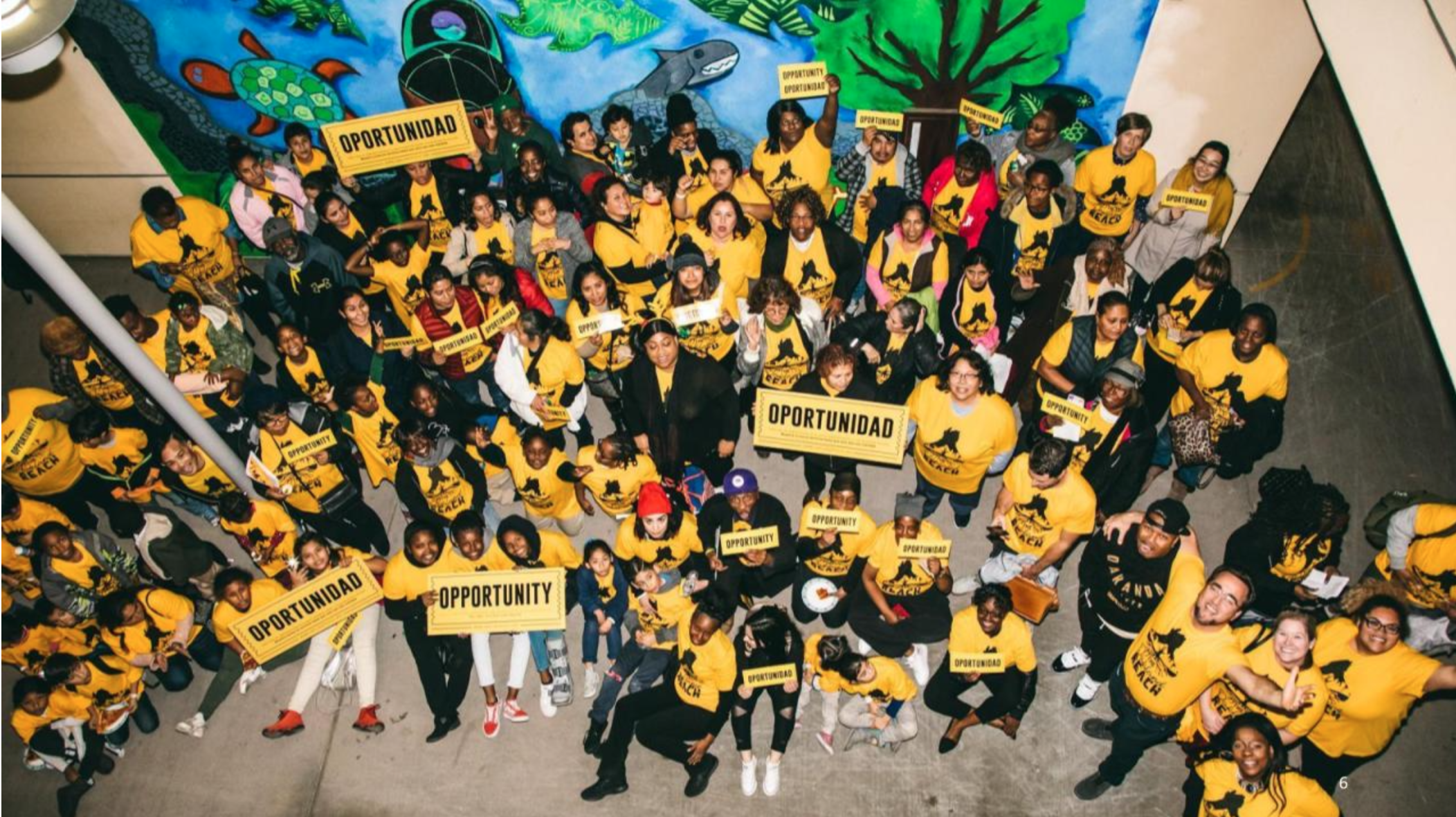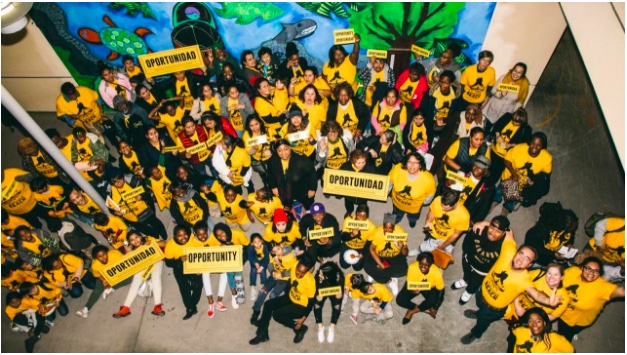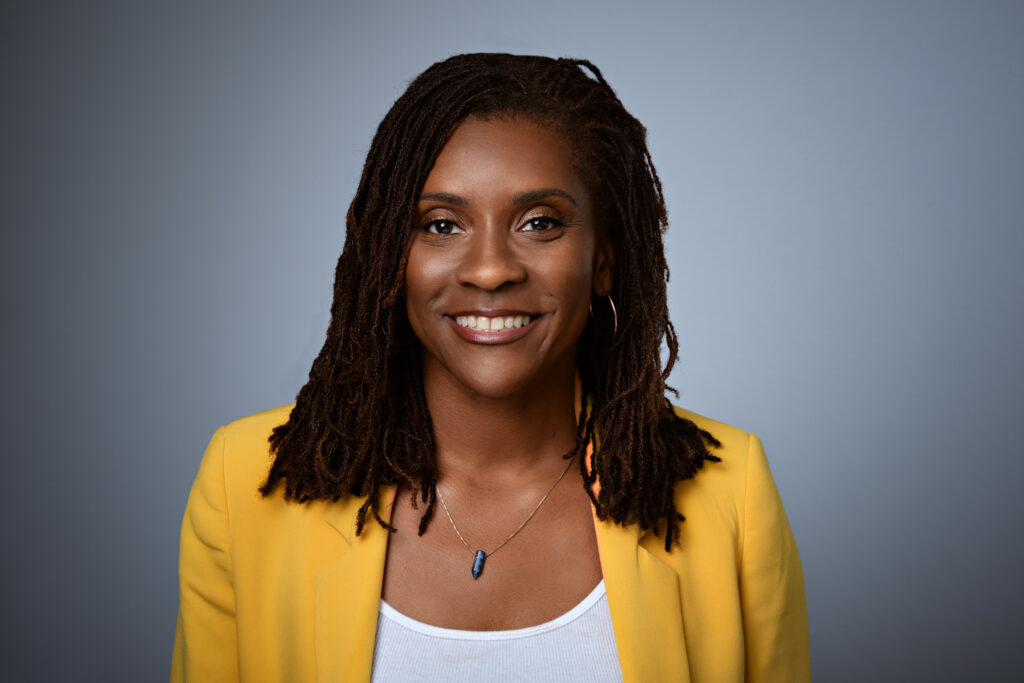People in Action: Leaders changing minds—and communities
The Center on Reinventing Public Education’s research often uncovers people with ideas or solutions that are worthy of a bigger stage. Our People in Action series offers space for leaders to explain—in their own words— how they’re addressing the critical needs of students in the hope of building a more equitable, joyful, and resilient public education system.
We invited parent advocacy leader Lakisha Young, founder and CEO of The Oakland REACH, to write a series of first-person accounts about organizing parents in Oakland, California, to work toward increasing Black and Brown student achievement. We detailed The REACH’s approach in a case study as part of our research on pandemic pods and microschools. She is currently a senior fellow at CRPE.
The Oakland REACH started as a small group—in the brightest yellow shirts we could find—standing in front of schools serving low-income Black and Brown families (the schools many of our children attended).
We were a group of fired-up parents who wanted to talk to every parent going in and out of the building: moms, dads, tias, papas and grandmas. We held clipboards with laminated data sheets to show parents the math and reading scores at their children’s school. Most of them had never seen this data before. If our yellow shirts didn’t grab their attention, learning about those numbers definitely did.
Most of the parents had no idea how their children’s school was performing, but all of them wanted a better life for their children. They saw education as one of the best pathways to that better life.
Listening to parents is the essential starting point of everything we do. But taking what we hear in those conversations—learning about their challenges, hopes, and desires—and building a solution is the real work.
What we heard outside those schools was clear: parents wanted something better. They wanted to drop their children off at schools that would provide a high-quality education. We knew then it was on us to be the architects of something different—to build our own solution.
We also knew we couldn’t operate in a vacuum. We had to take into account the ecosystem of the world around us when building something new.
At that time in 2017, Oakland Unified had a new superintendent (our fourth new leader in five years), an ongoing budget deficit, a ton of low-performing schools, and declining enrollment. The new superintendent was charged with implementing a new plan that called for school closures and consolidations: Oakland had about 50% more schools than neighboring Bay Area districts with the same number of students.
What a mess for parents! But we refused to let these changes be done to low-income families; it was time for change to happen with our families’ input.
We set out to build a solution that would direct attention to academic outcomes for our kids instead of focusing on the politics and the chaos. That meant our solution had to be bold. If we were going to ask parents for their time and if we were going to make headlines, we couldn’t just write letters. We had to go big or go home.

With those guidelines in place, our first policy action was born: fighting for priority enrollment in high-performing schools for kids in underserved communities when their schools close. Most of our families live in these neighborhoods. We called it the Opportunity Ticket.
Because we built the solution together with our parents, they understood the issue inside and out. They could stand up and speak confidently in front of leaders about why this policy was the right move.
Through the Opportunity Ticket campaign, we built a coalition that included white parents living in the wealthier “hills” of Oakland. We pushed them to do equity our way, and many of them stepped up for families in the lower-income “flatlands” of Oakland. These parents understood that what was good for their kids was good for our kids, too—and they were willing to risk their coveted enrollment seats to design a fairer system.
As one parent leader powerfully wrote at the time, “Is there any possible way that it is fair that some families should essentially be able to buy their way into the local public school of their choice? Are we any more deserving of priority in the student assignment system than lower-income parents who are much more likely to have kids at schools slated for closure? Of course not.”
In April 2018, we turned out hundreds of parents and supporters to the school board meeting to share stories. We demonstrated our power. And we kept showing up. We provided childcare, meals, and transportation so parents could keep participating. And one year later, in March 2019, the Oakland School Board passed the Opportunity Ticket unanimously.

We were ready to put the solution to the test when we learned that two schools—Parker and La Escuelita—were closing at the end of the 2021–22 school year. Our team, in yellow shirts, was in front of both schools every morning by 8 a.m. We’d get parents’ attention and let them know they qualified for an Opportunity Ticket, which gave them a shot at enrolling their child in a higher-performing school.
It wasn’t easy, but parents trusted us. Unlike special-interest folks protesting in front of these schools, our parent “liberators” came from the community. They could speak firsthand about taking the feeling of powerlessness and turning it into power.
Our solution worked: a stunning 92% of applicants from Parker and La Escuelita received their first choice for a new school for their child, and 97% received their first choice or second choice for new schools.
The Opportunity Ticket is proof that our power is our people. Our people may be closest to the problems, but that means they are also closest to the solutions. Our parents are becoming architects of the world they want to see for their children.
Want to learn more about how The Opportunity Ticket works and read the policy language? Check out https://oaklandreach.org/the-opportunity-ticket.





Don’t engage families: Liberate them
Lakisha Young
Senior Fellow